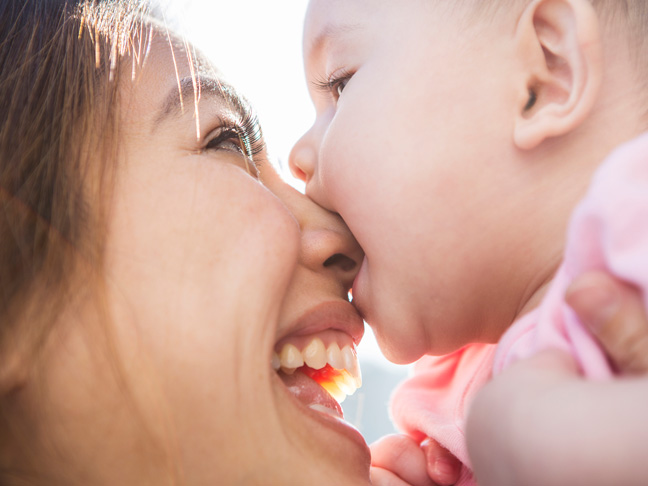I was lucky enough that my little guys didn’t experience too much pain and discomfort from teething. It might have been because their teeth came in slowly: one-at-a-time, and over a couple of years. Still, whenever they had an unexplained messy diaper, or felt just the tiniest bit warm, I always knew another tooth was popping through. Of course, if you Google any official medical site, they’ll tell you it’s bogus, but as any Mom will tell you, kids often exhibit these odd teething symptoms that seem unrelated. “While there’s not enough data to support a relationship between symptoms like low fever, runny nose, or diarrhea, you know your child, and if you think it’s teething related, it very well might be,” says Wendy Sue Swanson, M.D., a pediatrician at Seattle Children’s Hospital and The Everett Clinic, and author of Mama Doc Medicine. “Regardless though, any mild symptom would be treated the same way you might treat a little virus, so it’s not a big deal.” She adds that while it’s difficult to watch your child experiencing any kind of discomfort, teething is a developmental milestone, and part of a baby’s growth, so you shouldn’t worry or stress too much. With that in mind, here are some weird symptoms your child may have, and how you can best treat each one.
1. Fever
Some babies may experience a little rise in temperature when they’re teething, but not a true spike. “A child might get a small bit of a systemic fever response, but if it reaches 100.5 and lasts for a day or two, something else is going on and you’ll want to check with her doctor,” says Dr. Swanson.
2. Ear aches
If you notice your child swatting his ears, without any signs of fever or real discomfort, it may just be his teeth popping through, making his gums feel almost itchy. “So tend to the teething by giving him a cold, wet washcloth to chew or a teething toy,” advises Dr. Swanson. If he seems to be in real pain though and he’s actually pulling at his ears, you should have his pediatrician check his ears for an infection.
3. Eruption cyst
If you peek inside your child’s mouth and see a purplish dome on her gums, don’t panic! “It looks like it should hurt, but it actually doesn’t,” reassures Robert Delarosa, DDS, a Baton-Rouge-based pediatric dentist and past president of the American Academy of Pediatric Dentistry. “It usually pops up right before the tooth is about to break through, and once it does, it disappears, so you don’t have to treat it.”
4. Diarrhea
You may have heard that the excess saliva produced when teething can potentially lead to runny stools, but doctors are skeptical. “It’s more likely that the diarrhea is related to a nervous stomach, a psychological reaction to the discomfort of teething,” says Dr. Swanson. To avoid diaper rash, she recommends changing diapers frequently, and using a cream with zinc to provide more of a barrier.
5. Chin rash
All of that excessive drool during teething can also cause a rash on your child’s chin, a secondary effect of all of that irritating moisture on their delicate skin, explains Dr. Swanson. Apply a healing balm like Aquaphor to soothe the area.
6. Runny nose
While there’s no predictable or scientific reason for a clear, runny nose while teething, Dr. Delarosa says he’s seen it plenty. “I have had otherwise healthy children who are actively teething, displaying this symptom,” he says. “It is rare, and not one of the more common symptoms, but it does happen.”
7. Biting
Some babies will gnaw on anything, including your fingers, arm, hands, and their own crib rails, to relieve the itchy feeling of teething. The best thing you can do is give them a soothing alternative, like a cold teething toy to chew on, says Deena Blanchard, MD, a pediatrician based in New York City.
8. Decreased appetite
While teething, a baby’s gums are particular sore and sensitive and, for some, even breastfeeding can be unappealing. While missing a feeding here and there is no cause for alarm, if he misses several feedings in a row, you’ll want to call your pediatrician, says Dr. Blanchard.
9. Sleep disturbance
Your baby has been sleeping through the night, and suddenly she’s up. But here’s the thing: Teething pain tends to be worse at night. Acetaminophen can help ease your little one’s discomfort during the night, and minimize the wakings, says Dr. Swanson. If her symptoms last longer than a couple of nights though, check in with your pediatrician.
Point being, there are a whole host of symptoms that may very well be related to baby teeth erupting. At the end of the day, you know your baby best, so trust your gut; if you think she’s teething, she probably is. Still, if any of the symptoms are worrying you, or seem to go on for more than a couple of days, call your child’s doctor.
Photo: Getty








